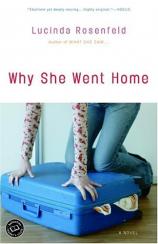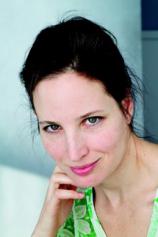Reading Group Guide
Discussion Questions
Why She Went Home

1. Almost thirty, with her work and love lives stalled, Phoebe Fine moves back to her parents' suburban home with precisely no plans for the future. A creative, intelligent woman from a loving--albeit eccentric-family, why can't she seem to settle into adulthood? Does she expect too much from life? Not enough? More generally, by Phoebe's age, do most people know who they are and what they want-or do we spend our whole lives trying to figure that out?
2. Phoebe wants to be supportive of her mother, who has cancer and is receiving chemotherapy treatments, but there are times when she shrinks from the very sight of Roberta's "awful auburn wig with the short bangs." In what way is Phoebe's reaction to (a family member's) illness true to life? In what way is Phoebe especially selfish? How does Phoebe's mother invite a lack of sympathy? How does that dynamic change by the end of the book?
3. Phoebe and her sister's rivalry and antagonism date back to early childhood. Why can't Phoebe seem to let go of her envy of and anger at Emily? Is it Phoebe's fault for caring so much, or Emily's fault for being so hostile? What is it about sisters in particular that make them so competitive? How does Phoebe come to understand Emily differently by the end of the book?
4. In Chapter VI, Phoebe returns to New York City for a night out with her girlfriends. Why does she suddenly long to be "trapped in her junior-sized trundle bed" in New Jersey? And what does she mean by questioning Manhattan's "dogged insistence on existing in the present tense, above and beyond history"? To what extent can a place be said to live in any tense? More generally, by retreating to the suburbs, do you think Phoebe is escaping life or trying to build a better one?
5. What does Phoebe mean by questioning Manhattan's "dogged insistence on existing in the present tense, above and beyond history"? To what extent can a place be said to live in any tense?
6. Phoebe slowly becomes attracted to her father's orchestral conductor, Roget, who is nothing if not rude. What is Roget's appeal to her? Is Roget an example of Phoebe's taste in men maturing or continuing to fail her? In Chapter I, Phoebe wonders if she'll "ever love another man as much as she did Leonard Fine." How is Phoebe's choice in romantic partners connected to her love for her father?
7. In Chapter 1, Phoebe wonders if she'll "ever love another man as much as she did Leonard Fine." How is Phoebe's choice in romantic partners connected to her love for her father?
8. Considering Rosenfeld's earlier novel, What She Saw . . . --- in which every chapter recounts Phoebe's experiences with a different boy or man --- how has Phoebe changed as a character? In what ways has she stayed the same? To what extent is she still dependent on men and male attention for her sense of self? How have her views on sex changed? How has her definition of "home" changed?
9. At the end of Chapter XV, Phoebe realizes that "she had come back to Whitehead not so much to care for her mother as to have her mother care for her. So she could imagine that she was still someone's daughter, still young and sweet and untarnished and in need of protection. . . ." Why has Phoebe been reluctant to grow up? How has this changed over the course of the book? Do we ever really stop thinking of ourselves as young? As someone's daughter/son?
10. Also at the end of Chapter XV, Phoebe realizes that "she had come back to Whitehead not so much to care for her mother as to have her mother care for her. So she could imagine that she was still someone's daughter, still young and sweet and untarnished and in need of protection. . . ." Why has Phoebe been reluctant to grow up? How has this changed over the course of the book? Do we ever really stop thinking of ourselves as young? As someone's daughter/son?
11. The classical music world of New Jersey is the book's unlikely backdrop. What role does classical music play for Phoebe? How do our parents' professional lives inform our own? How do they exert pressure over us?
12. Author Bliss Broyard comments, "Why She Went Home's candid take on family values couldn't come at a better time." What does she mean? How do the unique qualities of the Fine family parlay into a particular set of Fine family values? On the other hand, do you think there are universal values that should apply to every family?
13. The tone of Why She Went Home is decidedly comic. How does humor serve to enhance or take away from the seriousness of the subjects that Rosenfeld takes on, from illness to aging to loneliness? Can a book be tragic and comic at the same time? In what ways is life tragic and comic at the same time?
14. According to the old adage, one person's trash is another person's treasure. Why is "Dumpster diving" so exhilarating for Phoebe? There's the suggestion that this could be Phoebe's new vocation. How might it suit Phoebe better than her office/media job in Manhattan? Is it more likely to make her happy?
15. In Chapter 15, Phoebe lists "Ten Reasons Why Sex Is Overrated." Do you agree that sex is overrated? If you agree, can you expand on Phoebe's list? If you don't agree, could you make a counter-list of your own?
16. In Chapter 7, Phoebe wonders, "When had money become the object of her frustrated ambition . . . ? Once upon a time, not that long ago, sex had been her obsession." How can money replace sex? Are Phoebe's money issues resolved by the end of the book? What is the relationship between money and happiness, in general?
17. Do you think Phoebe and Roget have a good shot at "happily ever after"? Why or why not?
18. Can you imagine a third book in the Phoebe Fine Chronicles?
Why She Went Home
- Publication Date: March 1, 2005
- Genres: Fiction
- Paperback: 336 pages
- Publisher: Ballantine Books
- ISBN-10: 081297171X
- ISBN-13: 9780812971712







